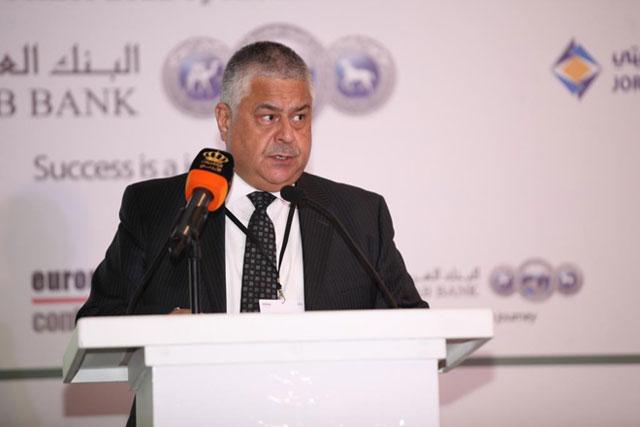You are here
Euromoney Jordan Conference forecasts ‘difficult economic year’
By Mohammad Ghazal - Mar 23,2017 - Last updated at Mar 23,2017

The continued border closure with Syria and Iraq, and the lack of progress in addressing these issues continue to hinder the economy, according to the Finance Ministry (Photo by Amjad Ghsoun)
AMMAN — The government on Wednesday announced that 2017 would be a difficult year for Jordan’s economy, and that economic growth is forecast between 2.2 per cent and 2.3 per cent.
The ongoing border closure with Syria and Iraq, the regional crisis and the lack of progress in addressing these issues continue to hinder the economy, Minister of Finance Omar Malhas said during the 2017 Euromoney Jordan Conference titled “Meeting the Financial Challenge.”
“2016 was not an easy year for Jordan, and data estimate economic growth at around 2 per cent at the end of 2016,” he said.
The minister stated that Jordan needs a growth rate that is double the forecast of this year, in order to address the unemployment rate, which exceeds 15 per cent.
Highlighting the inflation of the public sector, the minister stressed the key role of the private sector in stimulating the economy.
He said the government is working on several measures and projects to support the private sector and boost economic growth engine, but he noted that this role should be led by the private sector itself.
He explained that, by opening the door to public-private partnerships in the implementation of several mega projects, the government expects the private sector to be more involved.
Referring to the impact of the Syrian crisis on Jordan’s economy, the minister said that the country’s economic losses since the start of the crisis in 2011 stand at about $2.5 billion.
Only 4,000 of the 16,000 trucks working in the land transport sector are currently working, due to the closure of the borders with Syria and Iraq, he added.
Central Bank of Jordan (CBJ) Governor Ziad Fariz mentioned efforts made to enhance the financial inclusion of Jordanian, which he said plays a key role in driving economic growth and creating income-generating businesses and thus jobs for Jordanians.
The governor noted the great impact of regional and global conditions on Jordan, highlighting the current shift from free trade to protectionism.
“In Jordan”, he said, “although economic growth has been slow over the past period, it was still a positive growth, which is different from many countries in the region.”
“The quarrel at this stage is to maintain positive growth,” he stated, adding that the CBJ moved beyond its traditional role in supporting small and medium sized businesses, and efforts to help job creation.
Citing World Bank studies indicating that around 25 per cent of Jordanians have access to financial services, he said that there were many projects and efforts under way to enhance financial inclusion.
He outlined that Jordan had recently introduced financial literacy in schools’ curricula, and that a project to enhance financial inclusion of women was soon to be implemented.
“Financial inclusion is a key road to development and growth,” said Fariz at the conference, which gathered a total of 300 senior level financers, investors, business leaders and policy makers.
In a statement emailed to The Jordan Times, Victoria Behn, Director of Middle East and Africa at Euromoney Conferences, said: “In a region rife with conflict and instability, Jordan continues to offer a safe haven to investors. Today’s conference explores the many financial opportunities and challenges facing Jordan, and we are confident that this year’s event will help in the Kingdom’s journey to realising its true potential.”
Throughout the day, speakers and panellists highlighted Jordan’s strategic position as an attractive investment destination in the region.
Related Articles
AMMAN — Despite the massive spread of smartphones and e-applications in the Kingdom in recent years, which has allowed financial institution
AMMAN — The Kingdom's macroeconomic situation has remained relatively stable despite regional instability, high vulnerability, and other cha
AMMAN — Foreign currency reserve at the Central Bank of Jordan (CBJ) stands at $14 billion, which is enough to cover the Kingdom’s imports f


















